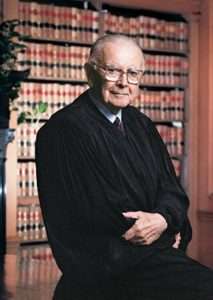The Volokh Conspiracy
Mostly law professors | Sometimes contrarian | Often libertarian | Always independent
Today in Supreme Court History: July 20, 1990
7/20/1990: Justice William Brennan resigns.

Editor's Note: We invite comments and request that they be civil and on-topic. We do not moderate or assume any responsibility for comments, which are owned by the readers who post them. Comments do not represent the views of Reason.com or Reason Foundation. We reserve the right to delete any comment for any reason at any time. Comments may only be edited within 5 minutes of posting. Report abuses.
Please to post comments


Califano v. McRae, 434 U.S. 1301 (decided July 20, 1977): Marshall turns down request to stay the Court's previous order allowing the Medicaid abortion ban to go into effect; movants are essentially asking a rehearing of two recent Court decisions allowing states to have their own bans on public funding for abortions, and Marshall dissented in those cases; Marshall points out that a request for rehearing must be directed at a judge who voted in the majority (so that means you can't ever move for a rehearing if the judge for your Circuit happened to be a dissenter?)
Hedrick v. Kelly, 548 U.S. 928 (decided July 20, 2006): denying stay of execution (Stevens and Ginsburg would grant the stay); Fourth Circuit had rejected ineffective assistance of counsel claim, and on procedural grounds rejected Brady claim (failure of prosecutor to turn over exculpatory material) and Atkins claim (executing "mentally retarded" is "cruel and unusual"), and substantive claim that he was "mentally retarded". Hedrick, after an evening of smoking crack and drinking, had kidnapped 23-year-old Lisa Crider, whom he knew to be a crack dealer's girlfriend and was probably carrying crack, robbed her and raped her, and then shot her in the face to avoid retaliation from the boyfriend. Hedrick was executed the same day as the stay was denied.
I read (forget where) that despite the circuit justice assignments one can make a single justice application to any justice, and after you hit up the second or third justice with the same request the case will be referred to the full court to prevent any more wasting of time.
I recall an old case, maybe out of Tennessee, implying that accepting federal funding required abortions notwithstanding a state ban. Did federal policy wobble back and forth over the years?
Carter put the kibosh on Medicaid for abortions (his famous words were, "life is not fair"), and then came the Hyde Amendment which prohibited any kind of federal funding. So far as I know the rule has never changed.
". . . and on procedural grounds rejected Brady claim (failure of prosecutor to turn over exculpatory material). . . ."
That's some extreme, hardcore justice that a request to stay an execution is denied on "procedural grounds."
Before the Virginia Supreme Court, defendant's Brady argument was precluded by court rule because he made it during oral argument but not in his opening brief. The Fourth Circuit considered this an "adequate and independent state procedural rule" and therefore untouchable.
With the "he" being the lawyer, right?
Yes. The law firm is listed on the case report and there's no mention of anyone being pro se.
If only he had seen "My Cousin Vinny."
It's often remarked how in many respects what goes on in that courtroom is legally accurate. However most courts would not let in a last-minute, uncredentialed expert such as Marisa Tomei, adorable as she is (despite her constant F-bombs). Possibly the Lane Smith character did not object because he figured he could destroy her on cross.
In fact most trials make bad comedy (and bad drama). That's because they're boring. Boring is good. You learn that as a lawyer. Surprises are bad; boring is good.
He did object! (Then he withdrew the objection after she solved his trick question.)
Sorry I forgot about that
Fred Gwynne deserved a Best Supporting Actor nomination (if not the Oscar) . . . and if anyone knows an Oscar-worthy performance in a courtroom, it's me!
(I am beginning to forgive that talentless hack, Ted Kramer. It wasn't his fault -- it was the Academy's.)
Wonder what type of exculpatory evidence was claimed to have been withheld?
The opinion (unsurprisingly) doesn't say.